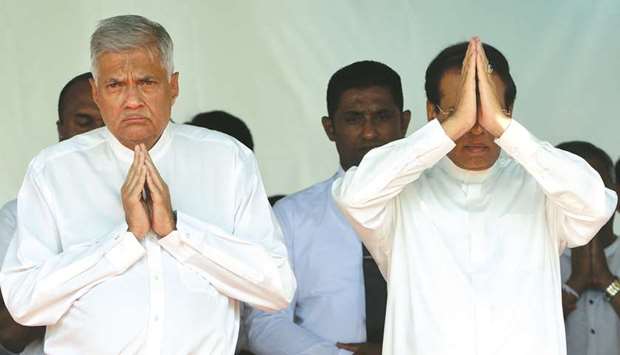Sri Lanka stepped up security yesterday as political parties staged low-key May Day commemorations after calling off scheduled rallies following fears of Islamist bomb attacks.
Officials said more police were deployed for cordon-and-search operations in many parts of the country, while the military also reinforced road blocks and patrols.
Several roads in the capital were closed yesterday as President Maithripala Sirisena and Prime Minister Ranil Wickremesinghe attended a tightly guarded public ceremony marking the 26th anniversary of president Ranasinghe
Premadasa assassination.
Officials said police used extraordinary security measures for Sirisena’s public appearance to commemorate Premadasa, who was killed by a suicide bomber during a May Day rally in 1993.
“His security used three identical convoys to bring the president to the commemoration,” a police official at the function said. “This was to make sure that no-one has advance warning about the
vehicles used by the president.”
Sirisena’s Sri Lanka Freedom Party (SLFP) cancelled its May Day celebrations and instead was holding a closed-door meeting with senior stalwarts later in the day,
officials said.
The country has been under a state of emergency since Easter Sunday attacks killed 253 people at three churches and three luxury hotels.
The emergency gives sweeping powers to police and the military to arrest and detain suspects for long periods.
Police say they have arrested over 150 people suspected of links to jihadists who carried out the bombings.
Prime Minister Wickremesinghe said Tuesday that some suspects remained at large. “A few more people involved in the attacks are out there and we hope to arrest them soon,” Wickremesinghe said. “Even if we arrest all of them, the threat will not disappear.”
He said Sri Lanka will have to work closely with international partners to neutralise the Islamic State, which claimed responsibility for the audacious bombings – the worst single-day attack against civilians on the island.
Sri Lanka blamed the local National Thowheeth Jama’ath (NTJ) for the bombings. The group had pledged an oath of allegiance to IS leader Abu Bakr al-Baghdadi, who in a recent audio message praised the
Sri Lanka attacks.
Schools were due to open on Monday, but authorities put it off by a week.
Police yesterday named nine people who staged Easter Sunday suicide bombings that killed 253 people, and said the attackers’ assets will be confiscated in line with anti-terror laws.
Police spokesman Ruwan Gunasekera confirmed that two of the luxury hotels were bombed by two brothers from a wealthy Colombo family involved in spice exports.
The group of militants had used one bomber at each of the locations hit on Easter Sunday, except at Shangri-La hotel where there were two suicide explosions.
One of the Shangri-La bombers was Zahran Hashim, the leader of the local jihadist group responsible for the audacious attacks that were claimed by the Islamic State group.
Hashim headed the National Thowheeth Jama’ath (NTJ) which has since been banned. He attacked the Shangri-La in the company of Ilham Ahmed Mohamed Ibrahim.
Ilham’s elder brother Inshaf Ahmed was the man who bombed the nearby Cinnamon Grand hotel.
The third hotel to be targeted, the Kingsbury, was bombed by a man identified as Mohamed Azzam Mubarak Mohamed. His wife was now in police custody, Gunasekera said.
The St Anthony’s Church was targeted by a local resident named Ahmed Muaz. His brother has been arrested. The St Sebastian bomber was Mohamed Hasthun, a resident from the island’s east where Hashim was based.
The church in the eastern district of Batticaloa was hit by a local resident, Mohamed Nasser Mohamed Asad.
Another man who failed to set a bomb off at a deluxe hotel, but blasted his explosives at a guest house near the capital. He was identified as Abdul Latheef who had studied both in Britain and Australia.
Shortly after the hotel bomb attacks, Fathima Ilham, the wife of the younger of the two brothers, blasted explosives strapped to herself, killing her two children and three police officers who rushed to the family home in Colombo.
“We are going to use prevention of terrorist financing laws to confiscate their property,” Gunasekera said.

Sri Lanka’s President Maithripala Sirisena, right, and Prime Minister Ranil Wickremesinghe attend a commemoration ceremony to mark the 26th anniversary of the assassination of Sri Lanka’s then-president Ranasinghe Premadasa, in Colombo yesterday.
